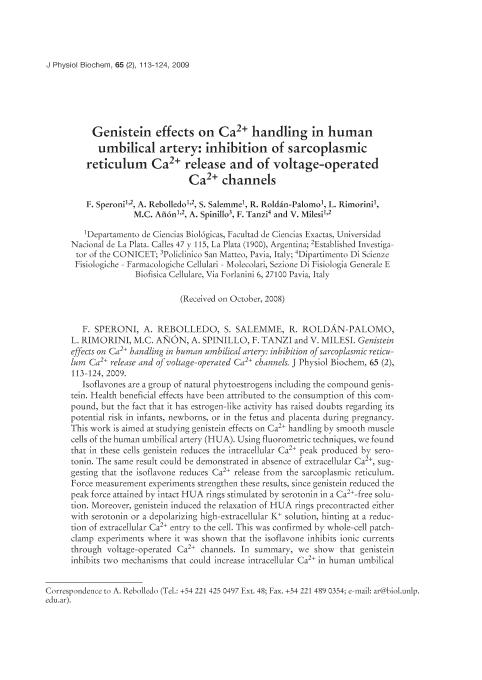Artículo
Genistein effects on Ca 2+ handling in human umbilical artery: Inhibition of sarcoplasmic reticulum Ca 2+ release and of voltage-operated Ca 2+ channels
Speroni Aguirre, Francisco José ; Rebolledo, Alejandro
; Rebolledo, Alejandro ; Salemme, Silvia; Roldán Palomo, R.; Rimorini, Laura; Añon, Maria Cristina
; Salemme, Silvia; Roldán Palomo, R.; Rimorini, Laura; Añon, Maria Cristina ; Spinillo, Arsenio; Tanzi, Franco; Milesi, Verónica
; Spinillo, Arsenio; Tanzi, Franco; Milesi, Verónica
 ; Rebolledo, Alejandro
; Rebolledo, Alejandro ; Salemme, Silvia; Roldán Palomo, R.; Rimorini, Laura; Añon, Maria Cristina
; Salemme, Silvia; Roldán Palomo, R.; Rimorini, Laura; Añon, Maria Cristina ; Spinillo, Arsenio; Tanzi, Franco; Milesi, Verónica
; Spinillo, Arsenio; Tanzi, Franco; Milesi, Verónica
Fecha de publicación:
06/2009
Editorial:
Servicio Publicaciones Universidad Navarra
Revista:
Journal of Physiology and Biochemistry
ISSN:
1138-7548
e-ISSN:
1877-8755
Idioma:
Inglés
Tipo de recurso:
Artículo publicado
Clasificación temática:
Resumen
Isoflavones are a group of natural phytoestrogens including the compound genistein. Health beneficial effects have been attributed to the consumption of this compound, but the fact that it has estrogen-like activity has raised doubts regarding its potential risk in infants, newborns, or in the fetus and placenta during pregnancy. This work is aimed at studying genistein effects on Ca 2+ handling by smooth muscle cells of the human umbilical artery (HUA). Using fluorometric techniques, we found that in these cells genistein reduces the intracellular Ca 2+ peak produced by serotonin. The same result could be demonstrated in absence of extracellular Ca 2+, suggesting that the isoflavone reduces Ca 2+ release from the sarcoplasmic reticulum. Force measurement experiments strengthen these results, since genistein reduced the peak force attained by intact HUA rings stimulated by serotonin in a Ca 2+-free solution. Moreover, genistein induced the relaxation of HUA rings precontracted either with serotonin or a depolarizing high-extracellular K + solution, hinting at a reduction of extracellular Ca 2+ entry to the cell. This was confirmed by whole-cell patch-clamp experiments where it was shown that the isoflavone inhibits ionic currents through voltage-operated Ca 2+ channels. In summary, we show that genistein inhibits two mechanisms that could increase intracellular Ca 2+ in human umbilical smooth muscle cells, behaving in this way as a potential vasorelaxing substance of fetal vessels. Taking into account that genistein is able to cross the placental barrier, these data show that isoflavones may have important implications in the regulation of feto-maternal blood flow in pregnant women who consume soy-derived products as part of their meals.
Palabras clave:
CALCIUM CHANNELS
,
GENISTEIN
,
HUMAN VASCULAR SMOOTH MUSCLE
,
UMBILICAL ARTERY
Archivos asociados
Licencia
Identificadores
Colecciones
Articulos(CENEXA)
Articulos de CENTRO DE ENDOCRINOLOGIA EXP.Y APLICADA (I)
Articulos de CENTRO DE ENDOCRINOLOGIA EXP.Y APLICADA (I)
Articulos(CIDCA)
Articulos de CENTRO DE INV EN CRIOTECNOLOGIA DE ALIMENTOS (I)
Articulos de CENTRO DE INV EN CRIOTECNOLOGIA DE ALIMENTOS (I)
Citación
Speroni Aguirre, Francisco José; Rebolledo, Alejandro; Salemme, Silvia; Roldán Palomo, R.; Rimorini, Laura; et al.; Genistein effects on Ca 2+ handling in human umbilical artery: Inhibition of sarcoplasmic reticulum Ca 2+ release and of voltage-operated Ca 2+ channels; Servicio Publicaciones Universidad Navarra; Journal of Physiology and Biochemistry; 65; 2; 6-2009; 113-124
Compartir
Altmétricas



